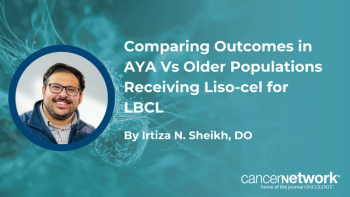
HER2 Gene Test Predicts Long-Term Pertuzumab Combo PFS/OS in Breast Cancer
HER2DX demonstrated the ability to select patients who are more likely to achieve disease control with anti-HER2 standard of care in the CLEOPATRA trial.
The use of HER2DX®, a diagnostic test for HER2-positive breast cancer, showed an ability to predict long-term survival outcomes in patients with HER2-positive breast cancer who received treatment with taxane plus trastuzumab (Herceptin) and pertuzumab (Perjeta; THP), according to findings from the phase 3 CLEOPATRA trial (NCT00567190).1
Investigators analyzed HER2DX in tumor samples derived from 214 patients who received THP in the CLEOPATRA trial. Findings indicated that HER2DX ERBB2 mRNA scores strongly correlated with progression-free survival (PFS) and overall survival (OS) outcomes in this population.
Developers will present detailed findings from this study at a future medical meeting. Additionally, investigators will submit these results for publication.
“The results of HER2DX in the CLEOPATRA trial are remarkable and highlight the test’s strong value in selecting patients who are more likely to achieve disease control and extended survival outcomes with the existing HER2 standards of care,” Javier Cortes, MD, PhD, chief of the International Breast Cancer Center in Spain and Co-founder of MEDSIR, said in a press release on these findings.1
According to developers, the possible advancement of new anti-HER2 therapies suggests a need for precise biomarkers to help inform treatment decision-making. Although the benefits of standard THP have been previously established in the field, the availability of new treatments may underscore the importance of appropriate therapy sequencing for patients with HER2-positive breast cancer.
“HER2DX in this setting will help decide the type of anti-HER2 therapies and their sequence. Patients with a HER2DX ERBB2-low score require closer attention, as they may not respond as well and may need alternative therapeutic strategies to improve their outcomes,” Cortes added.1
HER2DX was designed as a prognostic, predictive 27-gene expression test for use among patients with early-stage HER2-positive breast cancer. The assay combines clinical information such as tumor size and nodal status with biological information related to immune response tracking, luminal differentiation, tumor cell proliferation, and HER2 17q12-21 chromosomal amplicon expression.
In the double-blind CLEOPATRA trial, investigators compared the efficacy and safety of pertuzumab plus trastuzumab and docetaxel vs placebo plus trastuzumab and docetaxel among 808 patients with HER2-positive metastatic breast cancer. Previous findings published in the Lancet Oncology showed that after a median follow-up of more than 8 years, the improvements in OS with the pertuzumab-based regimen were sustained.2
The median OS was 57.1 months (95% CI, 50-72) in the pertuzumab arm compared with 40.8 months (95% CI, 36-48) in the placebo arm (HR, 0.69; 95% CI, 0.58-0.82). In each respective arm, the OS rates were 49% (95% CI, 44%-54%) vs 35% (95% CI, 30%-40%) at 5 years, 45% (95% CI, 40%-50%) vs 28% (95% CI, 24%-33%) at 6 years, 40% (95% CI, 35%-46%) vs 26% (95% CI, 21%-31%) at 7 years, and 37% (95% CI, 31%-42%) vs 23% (95% CI, 19%-28%) at 8 years.
Of note, neutropenia (49% vs 46%) was the most common grade 3/4 adverse effect (AE) in the pertuzumab and placebo arms, respectively. Additionally, 1% and 2% of patients in each group had deaths related to study treatment.
“In conclusion, [OS] and investigator-assessed [PFS] improvements with pertuzumab, trastuzumab, and docetaxel vs placebo, trastuzumab, and docetaxel observed in previous analyses were maintained after more than 8 years of median follow-up in CLEOPATRA,” Sandra M. Swain, MD, FACP, FASCO, the Associate Dean for Research Development at the Georgetown University Medical Center, the vice president of MedStar Genetic Medicine for MedStar Health, and a professor of medicine at Georgetown University School of Medicine, wrote with coauthors.2 “To our knowledge, this is the longest follow-up of patients for first-line treatment of HER2-positive metastatic breast cancer.”
References
- REVEAL GENOMICS® announces positive top-line results for HER2DX® in CLEOPATRA phase III trial. News release. REVEAL GENOMICS S.L. September 10, 2024. Accessed September 11, 2024. https://tinyurl.com/n84cfv77
- Swain SM, Miles D, Kim S-B, et al. Pertuzumab, trastuzumab, and docetaxel for HER2-positive metastatic breast cancer (CLEOPATRA): end-of-study results from a double-blind, randomised, placebo-controlled, phase 3 study. Lancet Oncol. 2020;21(4):519-530. doi:10.1016/S1470-2045(19)30863-0.
Newsletter
Stay up to date on recent advances in the multidisciplinary approach to cancer.













































